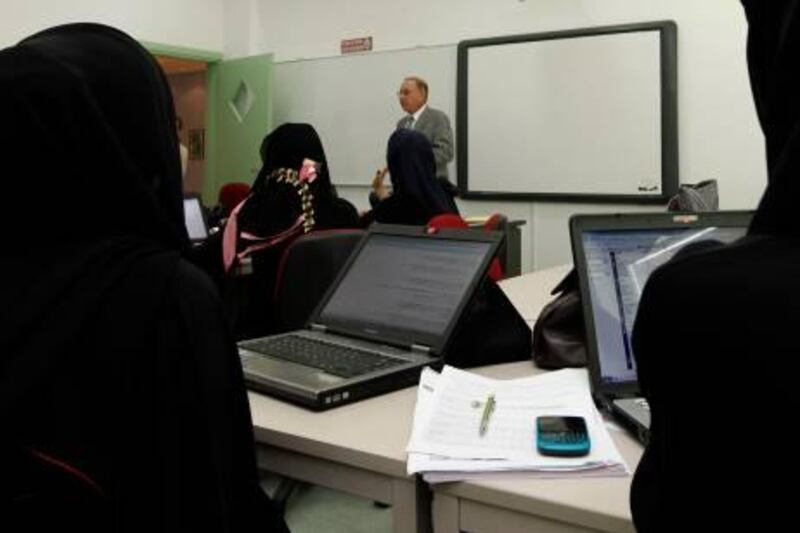DUBAI // Dubai Women's College is appealing for donations to make up a Dh1 million shortfall in assistance for needy students.
Each year, between 10 and 20 per cent of the 2,300 students at the institute, which is part of the Higher Colleges of Technology, ask for financial help with transport, computers and meals.
The federal college typically pays out Dh1.5m or more a year in grants of up to Dh2,000 a month for transport from remote areas, Dh5,000 for laptops and Dh30 a day for food in the college canteen.
But while the federal budget covers all Emirati students' undergraduate fees - up to Dh97,000 a year - it does not pay for grants, and Dubai Women's College (DWC) is still Dh1m short of what it says it needs.
With growing enrolment, this year's target for the grants has risen to Dh1.8 million.
So far, the Mohammed bin Rashid Al Maktoum Foundation has given Dh300,000, for 61 laptops, and the Dubai Islamic Foundation a further Dh500,000.
Last year, donors included the Red Crescent, Noor Islamic Bank and Sheikh Hamdan bin Mohammed, Crown Prince of Dubai.
This year, 97 of DWC's new students have asked for transport aid, 139 for laptops and 100 for food.
Fatma Al Thani, the student counsellor at the college, said many more students needed help but were ashamed to ask.
"It's important to remember that not all Emiratis are wealthy," Mrs Al Thani said. "Most students don't come and ask for help by themselves. They are very embarrassed to ask for money."
Beit Al Khair Society, a charity that helps needy Emiratis, reviews the requests on DWC's behalf, assessing each student's situation.
"Some students have around 10 siblings or more, or might have lost their father," Mrs Al Thani said.
"We have one student here with two sisters at the college, so for her mother it costs Dh6,000 alone in transportation from where they live, out towards Al Ain."
She said the college should look for other means of sponsorship, as the annual drive for donations was a challenge and growing harder.
"We used to have students who were sponsored but not any more, maybe because of the recession," Mrs Al Thani said. "We are looking at reaching out to some of our alumni, as we have around 5,000 now.
"The banks and companies doing this also only want the students with high scores and in the latter stages of their studies, as they see them as people they would hire, but these are not always the girls who need help."
Other HCT campuses also have to find funds for grants, although Dr Farid Ohan, the director of HCT's Sharjah colleges, said they had always managed.
"We have always had students in need, needs that are not normally covered by the budget we receive, such as food, transportation and more recently the required laptop," Dr Ohan said.
"Once we have established that a student is in genuine need, however, we have had not had any problems raising funds to support them from generous individuals, charitable organisations and private businesses in our community."
The Sharjah colleges have recently managed to help students with special needs. One was sent to Canada to receive treatment for a stutter.
Dr Ohan and Mrs Al Thani maintain that no student should drop out for want of basics.
"I am not aware of a single case where a student has presented us with a demonstrated need for food, transportation, or a laptop assistance without us finding a way to help them," said Dr Ohan.
Dr Robert Moulton, the head of the Ras Al Khaimah campus, said the local government providing buses was a "big asset". About 10 per cent of its 1,200 students require some kind of financial assistance.
Saeed Abu Al Reesh, the head of community relations at the RAK campus, said students were most likely to seek grants for laptops.
The local community, businesses and government offer support, Mr Al Reesh said.
"In the end we always get what we need but it takes time and hard work," he said.






